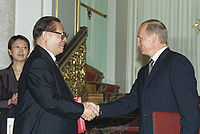2001 Sino-Russian Treaty of Friendship
The Treaty of Good-Neighborliness and Friendly Cooperation Between the People's Republic of China and the Russian Federation (FCT) is a treaty outlining a twenty-year cooperation between China and Russia. It was signed by the leaders of the two countries, Jiang Zemin and Vladimir Putin, on July 16, 2001.
| 2001 Sino-Russian Treaty of Friendship | |||||||||||||
 Jiang Zemin and Vladimir Putin after signing the FCT | |||||||||||||
| Chinese name | |||||||||||||
|---|---|---|---|---|---|---|---|---|---|---|---|---|---|
| Traditional Chinese | 中俄睦鄰友好合作條約 | ||||||||||||
| Simplified Chinese | 中俄睦邻友好合作条约 | ||||||||||||
| |||||||||||||
| Russian name | |||||||||||||
| Russian | Договор о Добрососедстве Дружбе и Сотрудничестве Между Российской Федерацией и Китайской Народной Республикой | ||||||||||||
Contents of the treaty
changeThe treaty describes actions that should be taken by the two countries to establish for peaceful relations and economic cooperation, as well as diplomatic and political reliance. Article 9 of the treaty has started controversy because it may be viewed as a defense pact, meaning if one of the two countries becomes involved in a war, the other country must help them. Additionally, articles A7 and A16 point at increasing military cooperation, including the sharing of "military know-how" (A16), namely, Chinese access to Russian military technology.
The treaty also describes a mutual, cooperative approach to environmental technology regulations and energy conservation; and toward international finance and trade. The document affirms Russia's stand on Taiwan as "an inalienable part of China" (A5), and highlights the commitment to ensure the "national unity and territorial integrity" in the two countries (A4).
Possible benefits
changeAnalysts have pointed out several different reasons for the FCT, mostly involving benefits for both China and Russia.[1]
China
change- China's armed forces are largely outdated, and they want to improve them. The treaty says that Russia will share their training and technology with China, which will help that.
- China wants a stable, consistent and affordable level of fuel shipments, especially petroleum. This goal can be better met by using Russian oil, including the construction of a Trans-Siberian oil pipeline.[2][3]
- China wants support for its stance on Taiwan.
Russia
change- Russia has had trouble getting capital since the dissolution of the Soviet Union. It will be able to get more capital in several ways through the treaty. They are:
- Russia wants to find employment for its skilled workforce.
- Russia wants to sell its military technology and knowledge.
- Russia wants to sell its large reserves of petroleum and natural gas.
Fear of US influence
changeBoth China and Russia fear the United States (especially following its strengthened geopolitical position following the September 11, 2001 attacks) becoming involved in areas which they believe should only be affected by their respective spheres of national influences and interests: for China, this largely involves Taiwan serving as a US client state, while for Russia it involves having various former Soviet Republics as US client states. Many of these do not border either country, though Kyrgyzstan and Tajikistan border China, and Kazakhstan borders both.
Economic competition with the US, Japan and the EU
changeThe United States, Japan and the European Union are three economic powers which have a skilled workforce and access to capital. Russia and China can more effectively compete against these powers in the world economy if Russia has access to Chinese capital and China has access to Russian training and technology.
References
change- ↑ "FindArticles.com - CBSi". www.findarticles.com. Archived from the original on 2005-04-18. Retrieved 2019-02-14.
- ↑ "China, Russia to honor commitments on oil pipeline". www.chinadaily.com.cn.
- ↑ "Putin: oil pipeline will serve China first". www.chinadaily.com.cn.
Other websites
change- Text of the Treaty – Ministry of Foreign Affairs of the People's Republic of China
- "China, Russia Sign Good-Neighborly Friendship, Cooperation Treaty" – People's Daily
- "China, Russia Sign Good-Neighborly Treaty of Friendship, Cooperation" (details) – The Chinese Embassy in Norway
- "Anniversary of Sino-Russian Good-Neighborly Treaty Marked" – China Internet Information Center
- "China, Russia to promote military cooperation" Archived 2006-05-07 at the Wayback Machine – People's Daily
- Chinese, Russian leaders exchange new year's greetings" (2006) – Xinhua
- "Chinese president arrives in Moscow for state visit" (2005) – People's Daily
- "Hu: Sino-Russian ties enter a new phase" – Xinhua
- "Russian-Chinese border most problematic ecologically" Archived 2012-02-04 at the Wayback Machine – RIA Novosti
- "Post-Cold War Sino-Russian Relations: An Indian Perspective" – Institute for Defense Studies and Analyses
- "Challenges of the Sino-Russian Strategic Partnership" (PDF) Archived 2006-05-17 at the Wayback Machine – Center for Strategic and International Studies
- "Power Politics in Central Asia" – Harvard Asia Quarterly